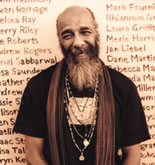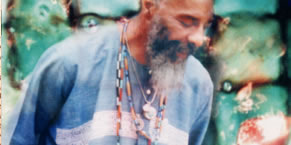 |
||||||||||
 |
||||||||||
A Conversation with Richie Havens (continued)
PM: Although you've written many, many great songs, you may well be--probably are the finest interpreter of other people's songs in our lifetime.
RH: Oh, boy. Well, they did it to me, I got to do it to everybody else now. That's the way I look at it. If I can get it, somebody else got to be able to get it, which is what it's about. They're mostly kids now. I mean, the kids that come to these concerts now, they start at five and they go up from there, and they're really incredible. The younger ones, they chase me in packs.
PM: Really?
RH: Oh, packs of five and six. "Hey, didn't I see you on TV? See, I told you. Awesome, man, awesome!" I mean, it's amazing. Then the teenagers, they just cry.
PM: Really?
RH: [laughs] They kill me, man, they're the most sensitive people we've made on this planet so far, let me tell you. I'm talking from 14 right up through 20, forget about it.
PM: This crop.
RH: Oh, absolutely. Absolutely they're the deepest thinking, deepest feeling human beings we've ever created. And it's across the board, it's not just here. And being that it's not just here, the other guys are way ahead of us. [laughs] You know? Because they've always been ahead of us, really, we just didn't know that. We were told they were fifteen years behind. When I went to England the first time, I realized we were fifteen and a half years behind them, which was really far out to find out. You go, "Holy smokes, they're hiding all of this from us. We don't even get it over there." Most of our music is owned by Europe now. All the record companies were bought by European companies.
PM: Really, is that so?
RH: Oh, yeah, oh, yeah. I mean, you think about Polygram buying MGM, the catalog at MGM. They bought A&M. They bought Elektra-Asylum. They bought Rhino, all of their catalog. Then, after they got it, Universal bought them.
PM: And is Universal European?
RH: No, but here's what happened. Once Universal got all of them, they sold it all to a French company. [laughs]
PM: Wow.
RH: [laughs] Yes, indeed, they did. Now France owns all of our music, Germany owns all of our music, England owns all of our music. We don't even own it. Every blues song you can think of is owned by France and England and Germany. And Scandinavia, too, big time.
PM: That's awful somehow.
RH: It is, because we don't even own our heritage. But they appreciate it enough to buy it. [laughs]
PM: Yeah, they always appreciated our music--
RH: And we depreciated it enough to sell it.
[laughter]
RH: The guys who sell it don't care.
PM: No.
RH: They really don't. They don't care. It's just a deal to them.
PM: When it comes to your famous covers, I mean, some are so big, "Just Like a Woman," or "Here Comes the Sun," or "All Along the Watchtower," but there's some that are equally good, utterly fantastic. I mean, I heard "The Great Mandala" the other day.
RH: Oh, God. I love that.
PM: That's an incredible song.
RH: [Sighs] That's one of the best songs ever written.
PM: Now, is that a Paul Stookey song, or...?
RH: No, that's Peter Yarrow. [Paul Stookey and Peter Yarrow of Peter, Paul & Mary]
PM: That's Peter Yarrow, right.
RH: Yep. Best song he ever wrote in his life. I told him that. [laughs] I said, "Yeah, it doesn't get any better than this. You can't. This is really high stuff."
PM: Yeah, "This house goes on sale every Wednesday morning..." Oh, man, that's an amazing song.
RH: It is, isn't it.
PM: And Stookey wrote great songs that people don't realize--
RH: Uh-huh.
PM: --I mean, "Whatshername," that was an incredible song...monster.
RH: Yeah. I just played with him last week, doing this Dave Van Ronk memorial to raise funds to finish Dave's last album, the one he was working on.
PM: Oh, lord.
RH: And he showed up, Noel [Paul] showed up, yeah. And a bunch of people, Tom Paxton, Odetta--
PM: Wow.
RH: Oh, gosh. There must have been 25 singers there.
PM: Where'd they have it?
RH: At the Bottom Line. It was really nice.
PM: And when I thought about obscure covers, I mean, "Darkness, Darkness" came to mind.
RH: Oh, yeah. Oh, I love that song.
PM: The Youngbloods, they really never got as famous as they deserved. Jesse Colin Young was writing great stuff.
RH: He certainly was.
PM: Or your cover of "Wear Your Love Like Heaven"--
RH: Yeah. [laughs]
PM: --is so different than Donovan Lietch's.
RH: Uh-huh.
PM: Great interpreters bring underlit material to greater light.
RH: Hopefully so. I sing it the way I first heard it. If you hear me singing it, that's the way it hit me. It may be faster or slower or whatever it is, but the way it comes out is the way it came at me, what the emotion of it was about.
PM: Among your covers of the songs of others, have you your own personal favorites?
RH: Well, there are so many great songs, and I think that I live in that world, where all of them are great.
PM: Yeah.
RH: It's like they all have their own eminent place. And for the next forty years--and hopefully more--they will mean something, and will always mean something to the person who's hearing them. A lot has been left out of the old story when they tell it to the young kids about what consciousness raising and consciousness was about back then. We were expanding our consciousness, and that's the way we said it. Whether it was LSD or whatever, music, whatever, that's the way we thought of it, as expanding our consciousness. That had a great deal to do with what came out. And so the kids now, they just get it as a record, or that CD, or a DVD, but that doesn't address what came out, because they just listen to the music as basically a record of something that's down, that's attainable. continue